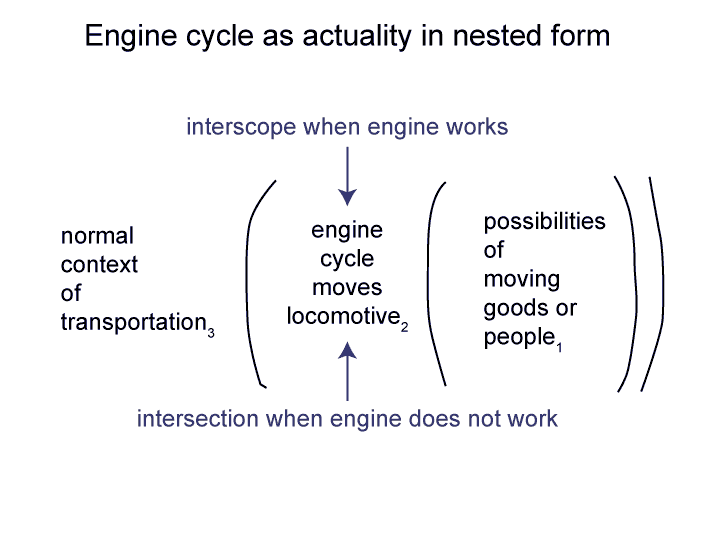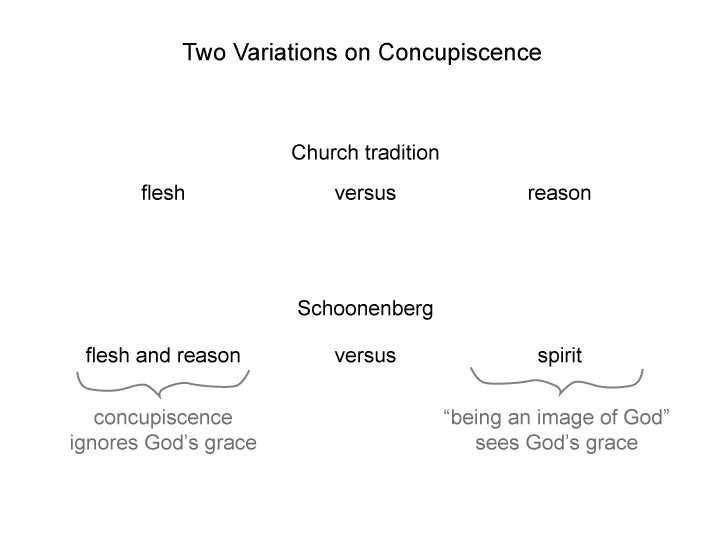Man and Sin by Piet Schoonenberg (1964) 2.3 CI
Summary of text [comment] page 82
[Schoonenberg’s variation is similar to a traditional Church reading of concupiscence.
It is also similar to the theory of Sigmund Freud, founder of modern psychoanalysis.]
Man and Sin by Piet Schoonenberg (1964) 2.3 CG
Summary of text [comment] page 82
[At this point, ‘concupiscence’ is a word supported by two oppositions, one belonging to Church doctrine and one belonging to Schoonenberg.
The technical difference may be described, using the Greek opposition, as follows:
For Church doctrine, ‘flesh’ is different than ‘reason’. ‘Flesh’ is subject to ‘the state of being with Cupid (a pagan god of desire)’. The fancy word for this state is ‘concupiscence’.
For Schoonenberg’s speculation, ‘flesh and reason’ are distinct but inseparable. Both are different from ‘spirit’. Both ‘flesh and reason’ are subject to concupiscence. Concupiscence encompasses both material and immaterial desires, as well as personal and social conditions.]
Man and Sin by Piet Schoonenberg (1964) 2.3 CF
Summary of text [comment] page 82
[Is a ‘concupiscence versus reason’ paradigm inadequate?]
Schoonenberg looked at Scripture. He found that concupiscence is also opposed to God’s law.
Here was a more adequate paradigm:
Concupiscence is both in the world and in the flesh. Concupiscence is a sinful attitude and an inability to integrate our tendencies in love. Concupiscence encompasses both soul and body. Concupiscence is the whole person in opposition to God’s
Man and Sin by Piet Schoonenberg (1964) 2.3 CE
Summary of text [comment] page 82
Schoonenberg reiterated the point.
In Church doctrine, concupiscence is a sequel to Original Sin.
This statement reflects a dualism in Greek philosophy. Concupiscence implies ‘the flesh as opposed to reason’. Since concupiscence is not subject to reason, it is regarded as bad.
This raises a question:
Can reason participate in concupiscence? Does concupiscence include reason?
Man and Sin by Piet Schoonenberg (1964) 2.3 CD
Summary of text [comment] page 82
Schoonenberg noted that his exposition differed from traditional church doctrine, where concupiscence is a sequel of Original Sin.
Schoonenberg’s ideas follow Scripture in reference to personal sins. Scripture presents personal sins as tendencies of both the body and the soul. Personal sin is related to sinful attitudes and the inability to integrate our tendencies in love.
[To me, Schoonenberg shifts the ground of the well-established concept of ‘concupiscence’.
He says: Yes, ‘concupiscence’ is related to Original Sin, as conceived by St. Augustine. But, it is also related to scriptural references that are independent of Augustine’s arguments for Original Sin.]
Man and Sin by Piet Schoonenberg (1964) 2.3 CC
Summary of text [comment] page 82
[Paul and John’s letters try to make sense of the mythos of Jesus the Christ.
Yet, I see another movement, another mythos, opening before me. First century Greek, Roman and (most likely) Aramaic languages were changing. Schoonenberg did not see that opening. But, he did see a crucial point.]
Schoonenberg noted that the oppositions between ‘flesh’ and ‘spirit’ and between ‘the world’ and ‘the Father’, in Paul and John respectively, called for a new theology.
This new theology saw concupiscence, not only in man’s material nature, but also in his whole human being, including his being among other human beings.
‘Concupiscence’ encompasses both our (post-first-singularity human) material and immaterial natures, as well as our personal and social natures.
Man and Sin by Piet Schoonenberg (1964) 2.3 CB
[These scenarios dramatically increase the weirdness of New Testament.
God’s Incarnation occurred precisely at the juncture when oppositions within the Jewish and Roman societies were … um … unzipping.
Their languages were coming undone.
Their political systems were fundamentally transforming.
Jesus preached to third generation.
His resurrection was preached to the fourth.]
Man and Sin by Piet Schoonenberg (1964) 2.3 CA
[In the early 7760s, Schoonenberg wrote on the cusp.
During and after the second battle of the enlightenment gods (The Hot Battle of the Fraternalist Ideologies: 7738-7745 U0’). A Progressive religion attained sovereign power in the USA. It had not consolidated power. It was the first generation of a new idolatry.
Schoonenberg was unaware that a change in the symbolic order constitutes an opening of the mythos.
In the USA, big government liberalism changed the meaning of the words of classical liberalism. Big government liberalism won the third battle of the enlightenment gods (The Cold Battle of the Materialist Ideologies 7745-7789 U0’). The American people lost that battle. Classical liberalism was eclipsed.
It does not matter what causes the change of a symbolic order, whether a discrepancy between lawdenial and lawacceptance, bureaucratic veiling of original meanings, apparent contradictions within the symbolic order itself, God punishing the iniquity of the parents in later generations, two civilizations making contact, the trauma of plague or war, migrations, and so on. The change in the symbolic order is mythic.
The system of differences changes.
Language changes.
Confusion deepens.
Novel meanings, presences and messages are revealed.]


